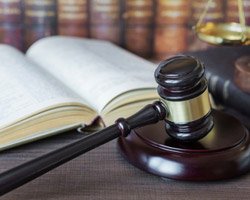Criminal Justice System
Investigation, Arrest and Arraignment
 Before a person can be tried and convicted of a crime, there must be a legal arrest, and charges must be filed. Though a police officer may personally observe illegal activity, like driving while intoxicated and other traffic violations, in most instances, law enforcement officers act based on information received from the public. Generally, before conducting a search of property or person, a police officer must witness illegal activity, have a reasonable belief that the person has, or is, committing an illegal act, or have a valid search warrant. Often, a police officer cannot make an arrest without a valid and enforceable arrest warrant. To be valid, the warrant must be signed by an unbiased judge, and must state the factual and legal support for the arrest.
Before a person can be tried and convicted of a crime, there must be a legal arrest, and charges must be filed. Though a police officer may personally observe illegal activity, like driving while intoxicated and other traffic violations, in most instances, law enforcement officers act based on information received from the public. Generally, before conducting a search of property or person, a police officer must witness illegal activity, have a reasonable belief that the person has, or is, committing an illegal act, or have a valid search warrant. Often, a police officer cannot make an arrest without a valid and enforceable arrest warrant. To be valid, the warrant must be signed by an unbiased judge, and must state the factual and legal support for the arrest.
After a person is arrested, he or she is booked, which usually includes being photographed, fingerprinted, and required to produce personal information.
Adjudication of a Criminal Charge
A defendant’s first appearance after arrest must take place within hours of detention. The exact amount of time varies by state.
At the first hearing, the court will decide whether the defendant has the right to be released or must first post bail. If bail is required, the court will set the amount, based on a number of factors, including:
- the severity of the crime;
- the likelihood the defendant will flee; and
- the existence (or absence) of a prior criminal record.
If the defendant is without counsel, the court will appoint an attorney to represent the defendant.
The next hearing is referred to as the “preliminary examination/hearing.” At this hearing, the judge will look at the evidence provided by the prosecution and determine whether a crime has been committed and whether there is evidence to support the assertion that the defendant committed the crime. Some states require that the evidence be submitted to a grand jury, and that the grand jury issue a formal accusation, known as an indictment, before trial can proceed. However, in most states, the prosecutor can file appropriate documents to move forward with the adjudication, based on the findings at the preliminary hearing.
Once the grand jury has issued an indictment, or if the prosecutor has decided to move forward, the court will hold a hearing to determine whether bail will be set, and how much it will be.
Depending on the offense, the defendant may then need to be arraigned. In an arraignment, the defendant appears in court, hears a reading of all charges, and is given the opportunity to enter a plea of guilty, not guilty, or no contest. The defendant may waive the right to an arraignment. Arraignment may be unnecessary for misdemeanor offenses.
Though the U.S. Constitution guarantees the right to trial by jury, the defendant may enter a plea bargain at any time. Most criminal cases are either dismissed or resolved by plea bargain before trial.
Trial
At trial, the prosecution must prove the defendant’s guilt beyond a reasonable doubt. The defendant has a right to confront any witnesses against him or her, and may compel them to testify in court. Furthermore, the U.S. Constitution allows a defendant to refrain from testifying against himself.
At trial, the parties may only introduce evidence that is relevant and non-prejudicial, including pictures, letters, and oral testimony. Because of concerns about the prejudicial nature of certain evidence, the court will typically hold hearings in advance of trial regarding the admissibility of evidence.
During trial, the jury will make all determinations of disputed facts. The judge will provide the jury with instructions regarding the laws, and will make all decisions regarding any legal issues, including the admissibility of evidence. If the jury returns a verdict of not-guilty, the defendant leaves the criminal justice system and may not be tried again for the same offense.
Sentencing
Some judges request pre-sentence reports from probation officers. These documents help acquaint judges with the convicted party’s social history, any legitimate explanations for the defendant’s behavior, and information about previous criminal activity.
Although some crimes require mandatory sentences, judges retain some discretion in sentencing. Convicted individuals have the right to present their testimony during a trial’s sentencing stage.
Once a judge has decided on one or more sentences, he or she then decides whether to impose them concurrently or consecutively. Some first-time offenders, and those who commit lesser crimes, may be eligible for probation. Probation is the suspension of a jail sentence that then allows the defendant to return to the community either with or without supervision.
Appeals
In a criminal case, the defendant or the prosecution may appeal errors of law. Neither party may appeal a perceived misunderstanding or misinterpretation of the facts by the jury. Because facts may not be appealed, the appellate courts do not have juries, but only judges or panels of judges. Typical bases for appeal include alleged errors regarding the admissibility or exclusion of evidence, as well as errors in instructions to the jury regarding the law. Not every error of law is sufficient to support an appeal, however. Some errors will be deemed harmless, that is, unlikely to have had a serious effect on the trial’s outcome.
Punishment
Although many defendants appeal their convictions, almost everyone is incarcerated throughout the time they are appealing.
Convicted criminals generally are assigned to facilities according to the nature of their crimes and overall criminal background. Whenever possible, they are kept near family.
When a prisoner is serving a sentence in an agreeable manner, he or she may become eligible for parole. Parole allows a prisoner to be conditionally released from jail but not from legal custody.
Connect with Top-rated Attorneys Near You
Sponsored Advertisement
Other Criminal Law Topics
What Are the Consequences of a Moving Violation?
Sex Crimes
Is There a Difference Between DWI and DUI Charges?
An Overview of the American Juvenile Justice System
Crimes Involving Theft: Receipt of Stolen Property and Embezzlement
Bankruptcy Fraud
Credit Card Fraud
Crime Classifications and Definitions
Understanding Larceny and Other Types of Theft Offenses
Defenses to Crimes
Electronic Surveillance
Environmental Crimes
Understanding the Nature and Consequences of a Felony Charge
Forfeiture
Fundamental Rights of the Accused
Healthcare Fraud
Internet Fraud
Juvenile Programs
Misdemeanor Crimes
Other Criminal Law
Phone Fraud and Telemarketing Fraud
Search & Seizure Law
Search and Seizure
Status Offenses
Juvenile Court Procedures and Sentencing
White-Collar Crime—What It Is and How It Differs From Other Crimes
All Criminal Law Topics
Latest Article
Arraignment: Meaning, Common Charges, & Process
Arraignment is a pivotal moment within the criminal justice system, marking the formal initiation of criminal proceeding... Read More
What Is Racketeering? Meaning, Examples, RICO & Charges
We hear the word a lot, but what is racketeering? In dealing with the complex realm of criminal enterprises, racketeerin... Read More
What Is an Indictment: A Comprehensive Guide
An indictment is a crucial step in the criminal justice process, serving as a formal charge against an individual for co... Read More
GETLEGAL®ATTORNEY DIRECTORY
Find Leading Attorneys in Your Area
NEED PROFESSIONAL HELP?
Talk to an Attorney
How It Works
- Briefly tell us about your case
- Provide your contact information
- Choose attorneys to contact you





